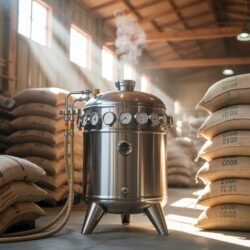If you’ve ever sipped a cup of anaerobically fermented coffee—think wild fruit, wine-like acidity, and layers of complexity—you might wonder how this innovative processing method became so popular in the specialty coffee world. The answer lies in the spotlight of global barista competitions, where champions and finalists have repeatedly chosen these unique coffees to wow judges and audiences alike.
The World Brewers Cup: A Launchpad for Innovation
The World Brewers Cup (WBrC) is one of the most prestigious events in specialty coffee, focusing on the art of hand-brewing. It’s here that anaerobically fermented coffee first made a major splash.
- 2018 – Emi Fukahori’s Breakthrough:
Emi Fukahori of Switzerland took home the World Brewers Cup title using Daterra’s anaerobically fermented Laurina coffee. Her victory marked a turning point for anaerobic processing, showing the world just how unique and delicious these coffees could be. Judges and spectators were captivated by the coffee’s vibrant flavors and clean finish, setting a new standard for competition routines. - 2024 – Martin Wölfl’s Winning Cup:
Fast forward to 2024, and Martin Wölfl of Austria won the World Brewers Cup with a natural anaerobic processed Gesha from Finca Maya in Panama. His routine highlighted the coffee’s honeydew, rosehip, and cherry notes, proving once again that anaerobic fermentation could deliver award-winning results. - 2025 – A Trend Continues:
At the 2025 World Brewers Cup in Jakarta, several finalists showcased anaerobically processed coffees, including Gesha and Excelsa varieties. This ongoing trend underscores the method’s staying power and its ability to consistently impress judges.
The World Barista Championship: Espresso Excellence
While the World Brewers Cup focuses on filter coffee, the World Barista Championship (WBC) is all about espresso. Here, too, anaerobic fermentation has made its mark.
- 2015 – Sasa Sestic’s Inspiration:
Sasa Sestic, Australia’s representative and eventual World Barista Champion, is widely credited with popularizing innovative fermentation techniques in competition. Inspired by winemaking, he used carbonic maceration—a form of anaerobic fermentation—to create a coffee that stood out for its complexity and depth. - 2021 – Hugh Kelly’s Liberica:
Hugh Kelly, the Australian Barista Champion, used a Liberica coffee that was later developed into an anaerobic-processed “World Champion Inspiration” blend. This further cemented anaerobic fermentation’s reputation for innovation and quality. - National Competitions:
Across the globe, national and regional barista championships have seen a surge in the use of anaerobically fermented coffees, especially Gesha varieties. In the US Barista Championship, for example, a significant number of competitors have featured these coffees, highlighting their appeal to both judges and coffee lovers.
National and Regional Brewers Cup Events
The trend isn’t limited to the world stage. National and regional Brewers Cup events have also embraced anaerobic fermentation.
- 2024 Turkish Brewers Cup Championship:
Şevval Nida Fetullahoğlu won using an anaerobic Gesha from Colombian producer Jairo Arcila, showcasing the global reach and appeal of these coffees. - Global Adoption:
From Europe to Asia and the Americas, anaerobic coffees are now a staple in competition routines, with finalists and champions regularly featuring them in their presentations.
Why Does It Matter?
Barista competitions are more than just contests—they’re trendsetters. When champions like Emi Fukahori and Martin Wölfl choose anaerobically fermented coffees, they inspire roasters, baristas, and coffee lovers around the world to explore new flavors and techniques. This ripple effect has made anaerobic fermentation a defining feature of modern specialty coffee, driving innovation and raising the bar for quality.
The Bottom Line
Thanks to the global stage provided by the World Brewers Cup, World Barista Championship, and national competitions, anaerobically fermented coffee has become a symbol of innovation and excellence in the specialty coffee world. Whether you’re a competitor, a roaster, or just a coffee enthusiast, these events have shaped the way we think about—and taste—coffee today.


